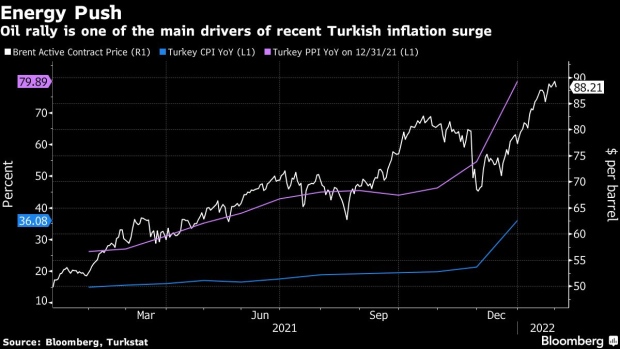Feb 2, 2022
Turkey Inflation Seen Surging to New High
, Bloomberg News

(Bloomberg) -- Turkey’s inflation rate likely accelerated to a near 20-year high in January, propelled by rising energy prices and President Recep Tayyip Erdogan’s push for lower borrowing costs.
Data due Thursday will show consumer price inflation surged for an eighth straight month to reach an annual 48%, according to the median estimate in a Bloomberg survey of 19 economists. That compares to 36.1% in December.
Turkey’s central bank has slashed its benchmark interest rate by 500 basis points since September in a series of moves encouraged by Erdogan, who has attacked elevated borrowing costs as a challenge for businesses and a brake on economic growth.
The cuts have pushed the official rate to negative 22% when adjusted for annual inflation, the lowest real yield across emerging markets, and sent the lira into a tailspin that’s accelerated consumer price rises.
Global pressures, including a surge in the price of gas and other commodities, exacerbated price increases in January and have also cast a pall over the medium-term inflation outlook.
Turkey’s Trade Gap Widens Most in 10 Years as Energy Bill Swells
Turkey’s central bank held rates steady in January but Erdogan, who espouses the unorthodox view that higher interest rates fuel inflation, signaled last week that he had no intention of abandoning his overall policy trajectory.
Key Insights
January is traditionally a high inflation month in Turkey as cold weather adds pressure on food prices and the government adjusts some taxes according to inflation rates recorded the previous year. This time, higher energy prices and household utility costs are also expected to take their toll.
The price of benchmark Brent crude, an indicator of corporate Turkey’s energy bills, hovered around a seven-year high in January, prompting analysts to raise their producer price estimates to near triple digits on an annual basis.
Utility companies have also begun to pass higher energy costs on to consumers, with the government unveiling historic increases in the price of household electricity. Annual retail inflation in Istanbul, the biggest city and commercial capital of Turkey, reached 50.91% in January, jumping from 34.18% a month earlier.
The central bank governor Sahap Kavcioglu has said that support for the local currency would be a key objective this year but has shown little sign this would involve a tighter monetary policy stance. The central bank is hoping to curb price growth by taking measures to encourage de-dollarization.
What Economists Say
For the lira to strengthen again, the central bank would have to raise interest rates significantly, according to Piotr Matys, an analyst at InTouch Capital Markets Ltd. “However, it’s a very unlikely scenario that the CBRT will make a U-turn amid persistent political pressure from the Erdogan administration to continue the monetary policy experiment,” he said.
We expect the release to show another surge in prices, with Turkish inflation reaching 48% in January. Further absorption of lira weakening into consumer prices, a 50% hike in minimum wages and a sharp increase in utility costs will add more price pressure. Ziad Daoud, Bloomberg Economics
The surge in commodity prices will continue adding to inflationary pressure, according to Istanbul Analytics economist Guldem Atabay. “The pass through from producers’ price inflation will push the annual consumer inflation to 55-60% levels swiftly by the end of first quarter” she said.
What To Watch
Turkey’s central bank will release current account data for both December and full year 2021 on Feb. 11.
Kavcioglu will chair the next rate-setting meeting on Feb. 17.
©2022 Bloomberg L.P.


